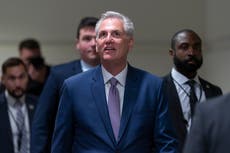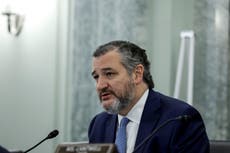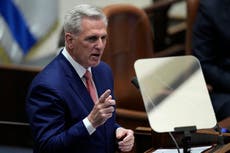Biden invites House and Senate leaders to White House as debt limit crisis looms
Mr Biden will meet with top House and Senate leaders on 9 May
President Joe Biden will convene a meeting with House Speaker Kevin McCarthy, House Minority Leader Hakeem Jeffries, Senate Majority Leader Chuck Schumer and Senate Minority Leader Mitch McConnell to discuss how best to stave of a catastrophic default on America’s sovereign debt by raising the government’s statutory debt limit.
The White House said Mr Biden invited Mr McCarthy and Mr McConnell — the top Republicans in the House and Senate — to the meeting in separate phone calls to each GOP leader on Monday.
The meeting, which is set to take place on 9 May, was announced by the White House just hours after Treasury Secretary Janet Yellen sent a letter to House and Senate leaders warning that the US could suffer an unprecedented default on its’ debt as soon as 1 June.
Ms Yellen urged Congress “to protect the full faith and credit of the United States by acting as soon as possible” to raise the statutory debt limit, which was first enacted more than a century ago to make it easier for the government to issue bonds without needing specific congressional authorisations each time it does so.
In recent years, Republicans have attempted to repeatedly weaponise the need to raise the debt limit periodically as a way to force Democratic presidents to adopt unpopular positions by threatening to allow the US to stop paying its bills, a scenario economists say risks a worldwide financial crisis.
Many Republicans, including former president Donald Trump, have demanded that the GOP use the possibility of a default on America’s soveriegn debt as leverage to extract concessions from the Democratic-controlled White House and Senate. The House, controlled by Republicans, last week passed legislation that would raise the debt limit while at the same time cutting spending on various government programmes. Among the programmess on the chopping block: President Joe Biden’s student debt relief initiative, as well as funding for new IRS personnel.
The plan would also add new work requirements for adults on Medicaid, cap the growth of the federal government, and impose 2022 limits on discretionary spending. The White House said in response to the bill’s passage that Republicans were attempting to “strip away health care services for veterans, cut access to Meals on Wheels, eliminate health care coverage for millions of Americans and ship manufacturing jobs overseas”.
It remains unclear whether Mr Biden will be forced to sign that bill, or whether Democrats will secure passage of a clean debt limit bill before the 1 June deadline passes.
Prominent GOP figures frequently claim that raising the statutory debt limit to enable the US to continue meeting financial obligations — a practice that was once routine under presidents of both parties and met no objections when it was done under Mr Biden’s predecessor — is akin to authorising new spending.
That claim, however, is not how the debt limit works. Raising the debt limit does not increase or decrease the amount of money that is spent on programmes that have already been authorised by Congress and have had funds allocated to them in appropriations legislation.
But experts say a failure to raise the debt limit would force the government to default on its debt and precipitate a worldwide financial crisis. The last time the US flirted with that disastrous outcome was 2011, when Republicans controlled the House and Democrats controlled the Senate and the White House. Mr Biden, then the vice president under Barack Obama, led the negotiations with congressional leaders that headed off a default, but not before the US had its credit rating decreased for the first time in history.
That 2011 dispute ended with Republicans suffering a drop in their approval ratings and facing accusations of endangering the US economy for political reasons. Those same charges are being raised again now by the White House and the president’s allies in Congress, who are holding firm and demanding that Republicans pass a clean debt ceiling bill and seek spending cuts through the budget process instead.
"It is not appropriate to use the loaded gun of default to coerce a particular menu of cuts,” Senator Chris Coons told reporters last week.
Join our commenting forum
Join thought-provoking conversations, follow other Independent readers and see their replies
Comments





Bookmark popover
Removed from bookmarks